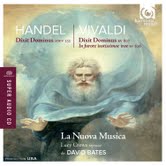In review--Baroque Composers Compete
Classical
Handel/Vivaldi
Dixit Dominus
La Nuova Musica
David Bates and Lucy
Crowe
Harmonia Mundi
One of the most popular Christian music settings, Dixit Dominus (music composition for
Psalms 109, or 110 in the Protestant Bible), offers baroque era vocalists a
workout. On La Nuova Musica’s recording,
Dixit Dominus, conducted by David
Bates, the musicians (instrumentalists and vocalists) perform Vivaldi’s third
setting of the Psalms 109/110 in D major and Handel’s sober setting in G minor
(going against the convention) and sandwiched between those two gems, soprano
Lucy Crowe performs the 4 movements of Vivaldi’s In Furore iustissimae irae (my favorite performance on the
recording).
A relatively young early music choir/orchestra, La Nuova
Musica has received critical acclaim and its star rose quickly into the
firmament of international early music ensembles. Certainly, this polished recording offers
crystalline vocals, passionate strings and regal trumpets arranged in such a
way that even a non-religious listeners hears the stirrings of God in it. Vivaldi’s setting RV807 (only discovered in
2005), leaps to life the moment you push play on the disc. The alternating chorus with soloists (usually
singing on the high end) further emphasizes the heart and soul of this composition. Gloria
Patri, et Filio features an
exquisite duet of sopranos that could leave a listener breathless from its
musical fragrance.
While RV 807 ignites religious passions through its
liveliness, Lucy Crowe’s vocals on In
Furore Iustissimae irae nearly shatter hearts. Only the Alleluia
rises above melancholy as it coloratura vocals impress. Handel’s setting of Dixit Dominus feels urgent and as the liner notes describe it, “Handel’s
deity is more vengeful than majestic.”
No one would ever describe this setting as light or lively and I felt a
mood shift happening between Vivaldi’s and Handel’s versions. This reminds us that composers have a variety
of interpretations for the same text and I would guess that their national
temperament, background and experience plays a role in the palette the composer
chooses to display. For instance,
Vivaldi represented the Italian style and Handel represented something heavier
from northern Europe (not that Handel didn’t compose lighter fare).
The countertenor Christopher Lowrey shines on Handel’s
setting, his vocals soaring way above the rafters. Anna Dennis delivers breathtaking vocals on Tecum principium in die virguitis and we
can feel her emotions coming through. Also
worth noting, Vivaldi sets the Psalms into 11 sections, including the final
AMEN while Handel condenses the Psalms to 8 sections/passages and he includes a
chorus, instead of sopranos on Gloria
Patri, et Filio. He includes soprano
I, II, and the chorus on De torrente in
via bibet.
Both Vivaldi and Handel’s settings for the Psalms offer
vocalists colorful and challenging material, but I prefer Vivaldi’s lively
approach to Handel’s more vengeful God.
In any case, La Nuova Musica offers us fodder for contrast and
comparison of two of the world’s most loved early music composers and their
interpretation of Biblical text.




Comments
Post a Comment